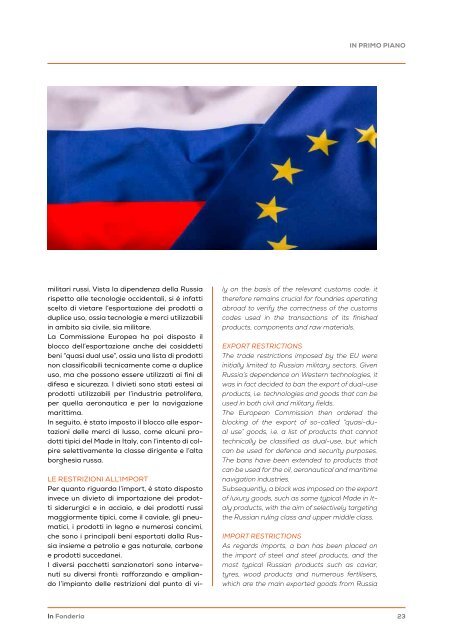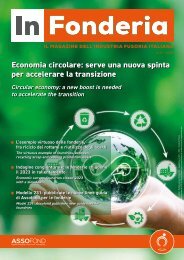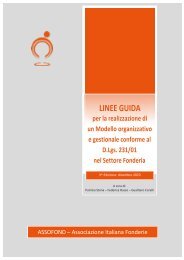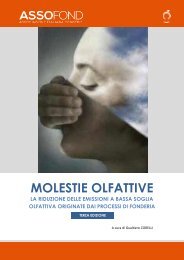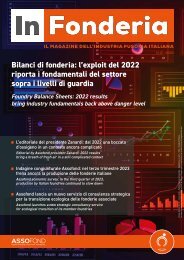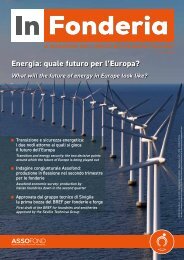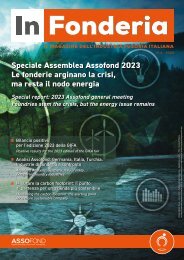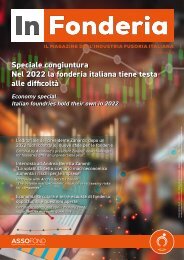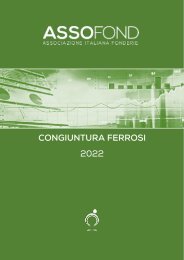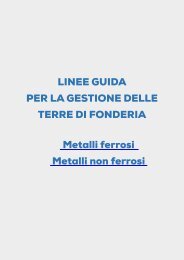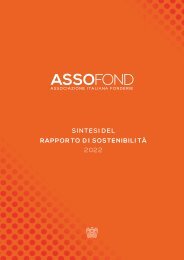In Fonderia 1 2024
Primo numero del 2024 di In Fonderia
Primo numero del 2024 di In Fonderia
Create successful ePaper yourself
Turn your PDF publications into a flip-book with our unique Google optimized e-Paper software.
IN PRIMO PIANO<br />
<br />
<br />
<br />
militari russi. Vista la dipendenza della Russia<br />
rispetto alle tecnologie occidentali, si è infatti<br />
scelto di vietare l’esportazione dei prodotti a<br />
duplice uso, ossia tecnologie e merci utilizzabili<br />
in ambito sia civile, sia militare.<br />
La Commissione Europea ha poi disposto il<br />
blocco dell’esportazione anche dei cosiddetti<br />
beni “quasi dual use”, ossia una lista di prodotti<br />
non classificabili tecnicamente come a duplice<br />
uso, ma che possono essere utilizzati ai fini di<br />
difesa e sicurezza. I divieti sono stati estesi ai<br />
prodotti utilizzabili per l’industria petrolifera,<br />
per quella aeronautica e per la navigazione<br />
marittima.<br />
<strong>In</strong> seguito, è stato imposto il blocco alle esportazioni<br />
delle merci di lusso, come alcuni prodotti<br />
tipici del Made in Italy, con l’intento di colpire<br />
selettivamente la classe dirigente e l’alta<br />
borghesia russa.<br />
LE RESTRIZIONI ALL’IMPORT<br />
Per quanto riguarda l’import, è stato disposto<br />
invece un divieto di importazione dei prodotti<br />
siderurgici e in acciaio, e dei prodotti russi<br />
maggiormente tipici, come il caviale, gli pneumatici,<br />
i prodotti in legno e numerosi concimi,<br />
che sono i principali beni esportati dalla Russia<br />
insieme a petrolio e gas naturale, carbone<br />
e prodotti succedanei.<br />
I diversi pacchetti sanzionatori sono intervenuti<br />
su diversi fronti: rafforzando e ampliando<br />
l’impianto delle restrizioni dal punto di vily<br />
on the basis of the relevant customs code: it<br />
therefore remains crucial for foundries operating<br />
abroad to verify the correctness of the customs<br />
codes used in the transactions of its finished<br />
products, components and raw materials.<br />
EXPORT RESTRICTIONS<br />
The trade restrictions imposed by the EU were<br />
initially limited to Russian military sectors. Given<br />
Russia’s dependence on Western technologies, it<br />
was in fact decided to ban the export of dual-use<br />
products, i.e. technologies and goods that can be<br />
used in both civil and military fields.<br />
The European Commission then ordered the<br />
blocking of the export of so-called “quasi-dual<br />
use” goods, i.e. a list of products that cannot<br />
technically be classified as dual-use, but which<br />
can be used for defence and security purposes.<br />
The bans have been extended to products that <br />
can be used for the oil, aeronautical and maritime<br />
navigation industries.<br />
Subsequently, a block was imposed on the export<br />
of luxury goods, such as some typical Made in Italy<br />
products, with the aim of selectively targeting<br />
the Russian ruling class and upper middle class.<br />
IMPORT RESTRICTIONS<br />
As regards imports, a ban has been placed on<br />
the import of steel and steel products, and the<br />
most typical Russian products such as caviar,<br />
tyres, wood products and numerous fertilisers,<br />
which are the main exported goods from Russia<br />
<br />
<strong>In</strong> <strong>Fonderia</strong><br />
23


